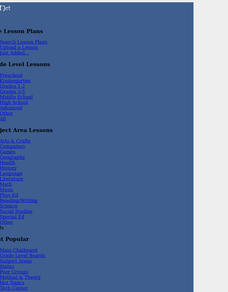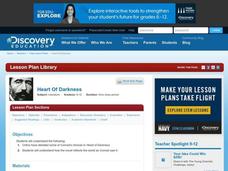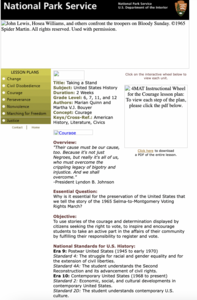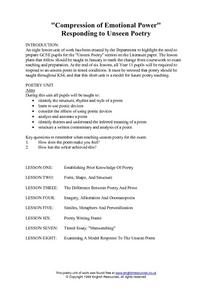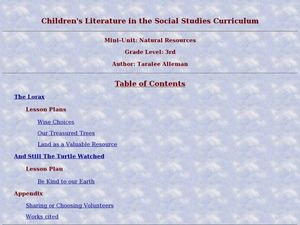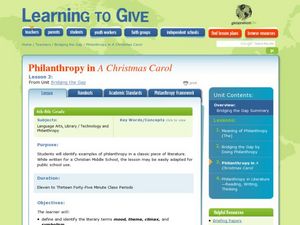Curated OER
Self-Esteem through Literature and Music
Learners research representations of self-esteem in music and literature, reflect on their meanings and use in developing positive attitudes. They make a presentations based on their research. They also keep a daily journal.
Curated OER
Literature Circles
Students complete the reading of an age appropriate piece of literature. They think critically about their reading and discuss it with a group of peers. Students make connections among their reading, their own lives, and the discussions...
Curated OER
What Makes the Writer Write?
Students study Charles Dickens's Great Expectations to gain insight into a classical piece of fiction and to explain how writers respond to social conditions. They also consider how that response is important today.
Curated OER
Literature Circles
Students respond aesthetically to a piece of text. They give book talks about a picture book their small group read and rate it. Each student has a different job in the literature cirlce during the discussions. Finally, the students...
Curated OER
Heart of Darkness
Students interpret the resolution of Joseph Conrad's Heart of Darkness. In this literature lesson, students discuss the ending of the novella and Conrad's intentions in ending it the way he did. Students then write alternative endings...
Curated OER
The Essential Brick
Learners examine their position within their school and discuss qualities they need to be productive citizens outside of school. they culminate the unit by writing an autobiography that includes the concepts of responsibility, choice,...
Curated OER
Kid Lit Crit
Students explore different types of student literature; they then write their own fiction pieces, in either fantasy/adventure or memoir/realism style.
Curated OER
Themes in Literature - Langston Hughes "Thank You Ma'm"
Eighth graders study Langston Hughes, "Thank You Ma'am" to discover the elements of plot, character motives and reactions. They express the effects of trust and kindness by writing a reflective personal narrative. They illustrate the...
Curated OER
A Swiftly Tilting Planet
Students familiarize themselves with science fiction/fantasy literature. They create an awareness of the different types of literature, develop an appreciation for them and be able to tell them apart. Students realize that science...
Curated OER
Interative History Notebook Mini-lesson
Students respond to Holocaust literature. In this interactive history lesson, students select quotes from chapter 1 of Elie Wiesel's Night and reflect on their meaning as they record their thoughts on poetic, prose, comic. or picture form.
Curated OER
Jargon
Eighth graders investigate the concept of jargon and how it is used in different contexts in relation to the study of vocabulary. They practice interpreting jargon by concentrating on the comprehension strategy of using context clues.
Curated OER
Taking a Stand - 1965 Selma-to-Montgomery Voting Rights March
Young scholars examine the 1965 Selma-to-Montgomery Voting Rights March. They view pictures reflecting their perceptions of their most important rights as citizens, write journal responses, create collages illustrating courage, and read...
Curated OER
It's Raining Meatballs
Students observe and demonstrate the process of summarization using the book "Cloudy With a Chance of Meatballs" by Judi Barrett. They silently read the story, and as a class discuss the five W's. Students then write a short summary of...
Curated OER
I Have a Dream
Students use flip video cameras to film a speech about the 'I Have a Dream' speech. In this poetry and speech lesson, students listen to the speech from Dr. Martin Luther King Jr. Students memorize part of the speech.
Curated OER
"Compression of Emotional Power"--Responding To Unseen Poetry
Eleventh graders identify the structure, rhythm and style of a selected poem, experience utilizing poetic devices and analyze an annotated poem. They evaluate the themes and inferred meanings to a variety of poems from their textbooks.
Curated OER
The Lorax
Third graders identify environmental problems. In this natural resources lesson plan students participate in several activities that support critical thinking about the environment and natural resources. The students write, list, and...
Curated OER
Philanthropy in A Christmas Carol
Students explore philanthropy in literature. In this cross curriculum literacy and character development lesson, students read A Christmas Carol by Charles Dickens and note charitable acts described in the story. Students relate story...
Curated OER
Mini-Unit: Natural Resources
Students explore how their choices affect others. In this character development and ecology lesson, students debate choice-making issues. Students listen to The Lorax by Dr. Seuss and identify choices the characters made about tree...
Curated OER
Dear Diary
Students analyze a piece of writing by creating diary entries based on a character. In this reading comprehension lesson plan, students read an assigned book with their classmates and create a sketch of what they believe the main...
Curated OER
Proud to Be of Service
Observe the National Day of Service and Remembrance with a service learning lesson plan. After discussing the events of September 11, 2001, learners plan and implement their own service learning project in honor of American heroes.
Curated OER
The Magic in Writing
Students watch a portion of a familiar film and write responses to a series of questions. They apply their observations to short stories.
Curated OER
My Diary From Here To There: Understanding Mexican Culture Through Research and Diary Entries
Third graders explore the adventures of an immigrant as she comes to the United States. They discuss the difficulties the immigrants had and they research the Mexican culture and society. Students create a diary of their own.
Curated OER
A Year of Reading
Utilize literature books for youth as a means to engage new readers and celebrate reading accomplishments.
Student Achievement Partners
Jacob and Wilhelm Grimm - "The Fisherman and his Wife"
Help young readers learn to read and interpret complex text independently. Teach young children to ask interpretive questions and use the text itself to answer them. Use art, word play and drama to provide a deeper understanding of...


